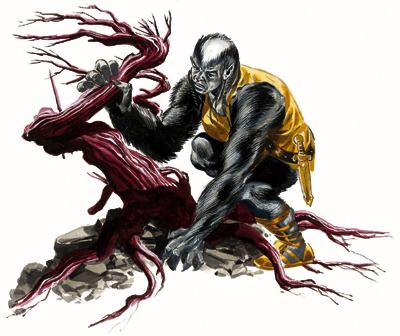At today's Wizards Presents event, hosts Jimmy Wong, Ginny Di, and Sydnee Goodman announced the 2023 line-up of D&D books, which featured something old, something new, and an expansion of a fan favorite.

The first of the five books, Keys from the Golden Vault, will arrive in winter 2023. At Tuesday's press preview, Chris Perkins, Game Design Architect for D&D, described it as “Ocean’s Eleven meets D&D” and an anthology of short adventures revolving around heists, which can be dropped into existing campaigns.
In Spring 2023, giants get a sourcebook just like their traditional rivals, the dragons, did in Fizban's Treasury of Dragons. Bigby Presents: Glory of the Giants will be a deep dive into hill, frost, fire, cloud, and storm giants, plus much more.
Summer 2023 will have two releases. The Book of Many Things is a collection of creatures, locations, and other player-facing goodies related to that most famous D&D magic item, the Deck of Many Things. Then “Phandelver Campaign” will expand the popular Lost Mine of Phandelver from the D&D Starter Set into a full campaign tinged with cosmic horror.
And then last, but certainly not least, in Fall 2023, WotC revives another classic D&D setting – Planescape. Just like Spelljammer: Adventures in Space, Planescape will be presented as a three-book set containing a setting guide, bestiary, and adventure campaign in a slipcase. Despite the Spelljammer comparison they did not confirm whether it would also contain a DM screen.
More information on these five titles will be released when we get closer to them in date.
The first of the five books, Keys from the Golden Vault, will arrive in winter 2023. At Tuesday's press preview, Chris Perkins, Game Design Architect for D&D, described it as “Ocean’s Eleven meets D&D” and an anthology of short adventures revolving around heists, which can be dropped into existing campaigns.
In Spring 2023, giants get a sourcebook just like their traditional rivals, the dragons, did in Fizban's Treasury of Dragons. Bigby Presents: Glory of the Giants will be a deep dive into hill, frost, fire, cloud, and storm giants, plus much more.
Summer 2023 will have two releases. The Book of Many Things is a collection of creatures, locations, and other player-facing goodies related to that most famous D&D magic item, the Deck of Many Things. Then “Phandelver Campaign” will expand the popular Lost Mine of Phandelver from the D&D Starter Set into a full campaign tinged with cosmic horror.
And then last, but certainly not least, in Fall 2023, WotC revives another classic D&D setting – Planescape. Just like Spelljammer: Adventures in Space, Planescape will be presented as a three-book set containing a setting guide, bestiary, and adventure campaign in a slipcase. Despite the Spelljammer comparison they did not confirm whether it would also contain a DM screen.
More information on these five titles will be released when we get closer to them in date.




